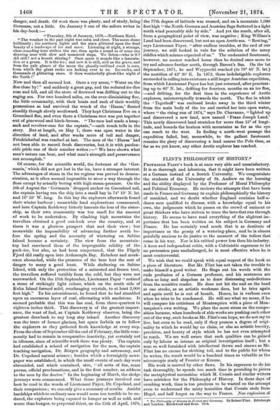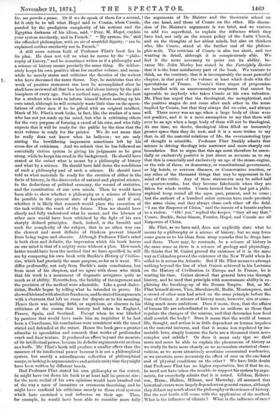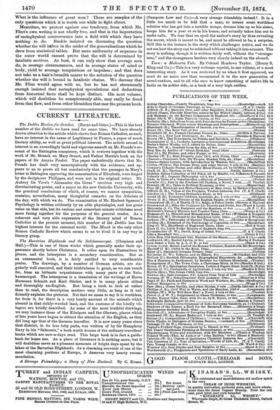FLINTS PHILOSOPHY OF HISTORY.*
PROFESSOR FLorr's book is at once very able and unsatisfactory. It is so thorough and laborious, that it might have been written at a German instead of a Scotch University. We congratulate the students of the University of St. Andrew on the learning and the ability displayed by the Professor of Moral Philosophy and Political Economy. He reviews the attempts that have been made in France and Germany to explain philosophically the history of mankind, and we doubt whether England contains half-a- dozen men qualified to discuss, with a knowledge equal to his own, the judgments which he passes on the crowd of eminent or great thinkers who have striven to trace the laws that run through history. He seems to have read everything of the slightest im- portance that has been written on his subject in Germany and France. He has certainly read much that is as destitute of importance as the gossip of a watering-place, and he is almost painfully anxious to do justice to the meanest of the toilers that come in his way. Nor is his critical power less than his industry. A keen and independent critic, with a Calvinistic eagerness to let no pretension pass unchallenged, he is most effective when he is most controversial.
We wish that we could speak with equal respect of the book as a piece of literature. But Mr. Flint has not taken the trouble to make himself a good writer. He flings out his words with the rude profusion of a German professor, and his sentences are often so long and shapeless as to draw distressing maledictions from the sensitive reader. He does not hit the nail on the head at one stroke, as an artistic workman does, but he tries again and again until he is out of breath. Hence, he is verbose even when he tries to be condensed. He will see what we mean, if he will compare his criticisms of Montesquieu with a piece of Mon- tesquieu's own writing. We place the more stress on the compo- sition because, when hundreds of able works are pushing each other out of the way, such books as Mr. Flint's can hope, we do not say to live, but even to be read, only if they possess a degree of origi- nality to which he would lay no claim, or else an artistic brevity, precision, and beauty of style which he has not even attempted to reach. We are well aware that such qualities can be gained only by labour as intense as original investigation itself ; but a man so well furnished with intellectual thews and sinews as Mr. Flint has no excuse for shirking toil, and to the public for whom he writes, the result would be a hundred times as valuable as the microscopic study of Fourier or Krause. His work is marred by other flaws. In his eagerness to do his task thoroughly, he spends too much time in pounding to pieces the metaphysical moonshine which M. Cousin and similar writers have mistaken for the Philosophy of History. In these days of crushing work, time is too precious to be wasted on the attempt even to understand the misty insanities that Cousin stole from Hegel, and half forgot on the way to France. Non ragioniam di
* The Philmophy of History In France and Germany. By Robert Flint. Edinburgh and London: Blackwood and Sons. 1874. for, ma guarda e passe. Or if we do speak of them for a second, let it only be to tell what Hegel said to Cousin, when Cousin, puzzled by the prodigious complexity of his notions and the Egyptian darkness of his idiom, said, "Pray, M. Hegel, explain your system succinctly, and in French." "My system, Sir," sitid The offended philosopher, with an air of wrathful dignity, "can be explained neither succinctly nor in French."
A still more serious fault of Professor Flint's book lies in its plan. He does not tell us what he means by the "philo- sophy of history," and he sometimes writes as if a philosophy and a science of history meant precisely the same thing. He deliber- ately keeps his own positive ideas for another volume, and mean- while he merely states and criticises the theories of the writers who have discussed the same theme. Nay, he maintains that the work of positive statement can best be accomplished after he shall have reviewed all that has been said about history by the phi- losophers of every age. Such a method may, perhaps, be the best for a student who seeks to inform himself before making up his .own mind, although he will certainly waste little time on the specu. lations of other men if he be gifted with an original intellect. Much of Mr. Flint's work looks, in fact, like the studies of a man who has not yet made up his mind, but who is criticising others for the very purpose of forming a creed of his own, and who fully expects that it will be ready for the public by the time that the next volume is ready for the printer. We do not mean that he really does not know what he believes;, we are only stating the bewildering impression sometimes left by his cross-fire of criticisms. And we submit that he has followed an -essentially vicious system in giving his judgments as he goes along, while he keeps his creed in tlie background. He should have stated at the outset what is meant by a philosophy of history and what by a science. He should have laid down the conditions of such a philosophy and of such a science. He should have told us what materials lie ready for the erection of either in the facts of history, in the discoveries of natural and physical science, in the deductions of political economy, the record of statistics, and the constitution of our own minds. Then he would have -been able to show whether a philosophy or a science of history be possible in the present state of knowledge ; and if not, whether it is likely that research would place the execution of the task within the reach of the future. Thus we should have clearly and fully understood what he meant, and the labours of other men would have been criticised by the light of his own sharply defined principles. Such, indeed, is the breadth and such the complexity of the subject, that in no other way can -the clearest and most definite of thinkers prevent himself from being vague and obscure. Although Professor Flint's mind is both clear and definite, the impression which his book leaves on our mind is that of a mighty maze without a plan. How much better would have been the method that we have specified, he will see by comparing his own book with Buckle's History of Civilisa- 4Wn, which had precisely the same purpose, so far as it went. We differ profoundly, not only from Buckle's main conclusions, but from most of his chapters, and we agree with those who think that his work is a monument of dogmatic arrogance quite as much as of ability. Nevertheless, the lucidity of the argument and the precision of the method were admirable. Like a good dialec- tician, Buckle began by telling what he intended to prove. He showed his hand with absolute frankness, and he stated his arguments -with a clearness that left no room for dispute as to his meaning. Hence there was nothing fitful, or capricious, or obscure in his criticisms of the course that history had taken in England, France, Spain, and Scotland. Except when he was blinded by passions that would have made him an inquisitor if he had 'been a Churchman, his conclusions were consistent with the creed stated and defended at the outset. Hence the book gave a greater stimulus to speculation and research than works of profounder reach and finer texture. It produced an effect beyond the measure of its intellectual power, because its definite arguments cut as clean as a knife. Mr. Flint's book will produce a smaller effect than the measure of its intellectual power because it is not a philosophical system, but merely a miscellaneous collection of philosophical essays, so lacking in argumentative and artistic unity that theymight have been written by different hands.
Had Professor Flint stated his own philosophy at the outset, he might have cut down his book to at least half its present size ; for the mere recital of his own opinions would have brushed out of the way a mass of immature or erroneous theorizing, and he might have confined his criticisms merely to those rival systems which have exercised a real influence on their age. Thus, for example, he would have been able to consider more fully
the arguments of De Maistre and the theocratic school on the one hand, and those of Comte on the other. His discus- sion of De Maistre's arguments is too brief, and we venture to add too superficial, to explain the influence which they have had, not only on the recent policy of the Latin Church, and on the thoughts of her ablest minds, but also on thinkers who, like Comte, stand at the further end of the philoso- phic scale. The criticism of Comte is also too short, and too wanting in detail, although it is conspicuously able. We feel it the more necessary to point out its ability, be- cause Mr. John Morley has stated in the Fortnightly Review that it is the least satisfactory part of the book. We venture to think, on the contrary, that it is incomparably the most powerful chapter, in that part of the volume at least which deals with the speculations of France. Comte's three stages of progression are handled with an unceremonious roughness that cannot be agreeable to anybody who takes Comte at his own valuation. Mr. Flint has urged that the theological, the metaphysical, and the positive stages do not come after each other in the sense implied by Comte, but that they always did co-exist, and always will. There never was an age when a large body of ideas were not positive, and it is a mere assumption to say that there will ever be an age when a large body of them will not be theological. At one time, no doubt, theological ideas filled an immensely greater space than they do now, and it is a mere truism to say that, in all the material relations of life, the overmastering type of thought is scientific. Professor Flint frankly admits that science is driving theology into narrower and more sharply-cut boundaries. But to argue that this age must therefore be essen- tially or exclusively positive is just about as accurate as to say that this is essentially and exclusively an age of the steam-engine, or the rule of three, or democracy, or constitutional government, or big hotels, or nervous diseases, or Conservative reaction, or any other of the thousand things that may be uppermost in the mind of the critic. Any of these statements may be called half or quarter-truths, but they become falsehoods when they are taken for whole truths. Comte fancied that he had put a philo- sophical hoop round all the ages, past, present, and to come ; but the authors of a hundred other systems have made precisely the same claim, and they always chase each other off the field. "I am the Emperor of China," said the inmate of a lunatic asylum to a visitor. " Oh ! yes," replied the keeper, "they all say that." Comte, Buckle, Saint-Simon, Fourier, Hegel, and Cousin are all Emperors of China.
Mr. Flint, as we have said, does not explicitly state what he means by a philosophy or a science of history, but we may form some guess as to his ideas from stray remarks that he drops here and there. There may, he contends, be a science of history in the same sense as there is a science of geology and physiology. He thinks that M. Guiziat proved the existence of it in the same way as Columbus proved the existence of the New World when he sailed to it across the Atlantic. But if Mr. Flint means to attempt nothing beyond the line of what Guizot achieved in his Lectures on the History of Civilisation ia Europe and in France, he is wasting his time. Guizot showed that general laws run through history, and he used that principle with consummate ability in ex- plaining the breaking-up of the Roman Empire. But, as Mr. Flint himself shows, Vico, Macchiavelli, Bodin, Montesquieu, and a crowd of other men had acted on the game principle before the time of Guizot. A science of history must, however, aim at some- thing much more ambitious. Does it mean, then, that the affairs of human life are subordinated to laws as uniform as those that regulate the changes of the seasons, and that determine how food shall nourish the body ? Does it mean that the world of human life, thought, and action is as little dependent on human impulses as the material universe, and that it seems less regulated by im- mutable laws, simply because the facts are a thousand times more complex and subtile ? Or does it mean only dot we shall more and more be able to explain the phenomena of history as we study its facts more closely, as we accumulate statistical obser- vations, as we more attentively scrutinise econominal tendencies, as we ascertain more accurately the effect of race on the one hand and of physical conditions on the other? We have little doubt that Professor Flint has no higher expectation, but if that be so, he need not have taken the trouble to support his system by argu- ments, for everybody admits that it is sound. Gibbon, Robert- son, Hume, Hallam, Milman, and Macaulay, all assumed that historical events were largelydependent on general causes, although they didnot say much about the philosophy or the science of history. But the real battle will come with the application of the method. What is the influence of climate ? What is the influence of race?
What is the influence of great men ? These are samples of the only questions which it is worth our while to fight about.
Meantime, we protest against one tendency, from which Mr. Flint's own writing is not wholly free, and that is the importation of metaphysical controversies into a field with which they have nothing to do. Buckle insisted on discussing the question whether the will iatfave in the midst of the generalisations which he drew from statistical tables. But mere uniformity of sequence in the outer, world cannot prove that the will is determined by fatalistic motives. At best, it can only show that average men do, in average circumstances, and in average states of mind or body, yield to average temptations or impulses ; and that does not take us a hair's-breadth nearer to the solution of the question whether the will is bound in fatalistic chains. We daresay that Mr. Flint would agree with us, but he has not strenuously enough insisted that metaphysical speculations and deductions from historical facts shall be kept distinct. His next volume, which will doubtless be conspicuously able, may easily be freed from that flaw, and from other blemishes that mar the present book.




































 Previous page
Previous page